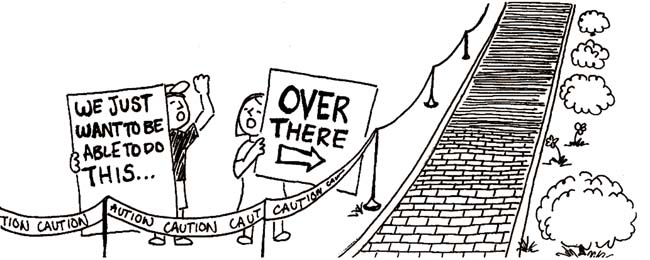The recent green-light rating from the Foundation for Individual Rights in Education is a marker of the progress that the College of William and Mary has made to protect the right to free speech on campus. Since receiving a red-light rating in 2009, the College administration and the Student Assembly have worked to lessen the restrictions of where free-speech events can be held on campus. The College should be proud of these improvements; however, we hope that the administration will not abandon its efforts to guarantee students’ rights on campus. The College still has a long way to go to ensure that all students’ voices are heard.
Unfortunately, students wishing to conduct a protest on campus still have to cut through the barrier of red tape the College has constructed. Free-speech activities may be hosted in a variety of spots on campus — although the College prefers they be hosted in the Crim Dell Ampitheater — but the individuals and groups wishing to host these events must first seek approval from the Scheduling Office. Furthermore, there are also specified “distribution of literature” locations on campus. While we applaud the College for allowing free speech, we cannot help but wonder: Why isn’t the entire campus a free-speech zone?
Students should be allowed to exercise their right to free speech and distribute information in a way that will gain the attention their movement needs to affect change. In order to stage a successful movement, the individuals must be able to advertise and discuss their tenets with all members of the College community. Currently, campus restrictions make creating a forum for students and administrators to discuss issues unnecessarily difficult. Under the current system for registering a free speech activity on campus, individuals have trouble making the entire campus aware of their goals and methods. The College needs a system that will enable organizations and individuals to host effective free-speech events that can engage the entire campus community.
We do not advocate demonstrations that will disrupt the College’s daily functioning, nor do we condone harassment of members of the College community. We also acknowledge that the College is responsible for the safety of its students. However, we believe that the current restrictions on free speech on campus are detrimental to student activism. Students at the College are often criticized as being apathetic, but the root of the problem may be that students are not given the chance to productively and thoughtfully express their perspectives to campus.
There is a clear line between free speech and harassment. Free speech promotes analytic thoughts and a more civically engaged community. The College needs to do more to encourage this productive expression of opinions and beliefs on campus by simplifying the process of staging a free-speech event. While the College should be praised for the strides it has made to encourage free-speech activities on campus, the administration and students must continue to work together to create a safe place for students to express their opinions effectively.

